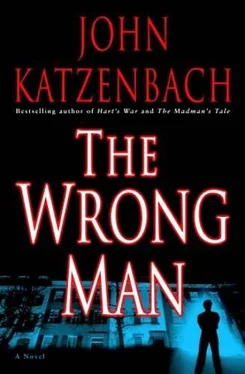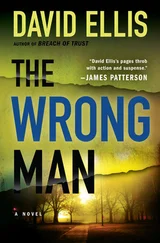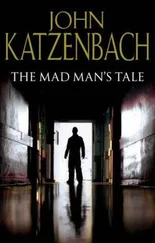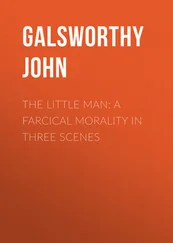He told Ashley that he wanted to hear from her daily, just to make sure that things were okay, and so they set up a regular early-evening phone call. Ashley, even with her fiercely independent streak, had not objected. He was unaware that Sally had proposed precisely the same arrangement.
For her part, Sally suddenly found that nothing in her life seemed in order. It was a little as if she had become detached from all the anchors in her existence, with the single exception being Ashley, and even that was tenuous. The purpose for her daily phone calls to her daughter, she came to understand, had as much to do with regaining some sort of foothold on who she was herself as with being reassured that Ashley was okay. After all, she told herself, the incident with O’Connell was merely the sort of commonplace unpleasantness that all young people go through at some point.
But far more disturbing to her was the less-than-effective work she was doing in her law practice, and the growing tension between Hope and herself. Clearly, something was wrong, but she could not bring herself to focus on it. Instead, she threw herself into her various cases, but in a distracted, erratic way, where she would devote too much time to a small issue dogging one case, while ignoring large problems that shouted for attention in others.
Hope merely dragged herself through each day, wondering what was happening. Sally wouldn’t really fill her in, she couldn’t call Scott, and for the first time in all the years she and Sally had been together, she thought it was inappropriate for her to call Ashley. She threw herself into the team, as it pushed toward the play-offs, and into her counseling work with struggling underclassmen. She felt as if she were walking across shards of broken glass.
When Hope received an urgent message from the school’s dean of faculty, it took her by surprise. The command was cryptic: Be in my office at 2 p.m. Sharp.
Some thin, wispy clouds were scudding across a slate-colored sky as Hope hurried across the campus to be on time for her meeting. She could feel a sullen pre-winter cold creeping through the air. The dean’s office was in the main administration building, a remodeled, white Victorian home, with wide, brown wooden doors, and a fireplace in a reception area with a log burning. None of the students ever went there unless they were in deep trouble.
She pushed her way in, nodded to some of the office workers, and went up to the second floor, where the dean of faculty had his small office. He was a veteran of the school and still taught a section of Latin and a class in ancient Greek, clinging to classics that were increasingly unpopular.
“Dean Mitchell?” Hope said, peeking her head through his door. “You wanted to see me?”
In her time at the school, she had spoken with Stephen Mitchell perhaps a dozen times, maybe less. They had served on a committee or two together, in years past, and she knew he had happily attended a championship game she had coached, although his own preference was generally for the boys’ football team. She had always thought him to be funny, in a grumpy prep school, Mr. Chips sort of way, and never thought of him as judgmental-which was her standard for most people. If they could accept who she was, then she was willing to go more than the extra mile to accept them. It went with the territory of living an alternative lifestyle, which was the odious phrase used where Sally and she lived, and which she despised, because it seemed utterly devoid of romance.
“Ah, Hope, yes, yes, yes, please do come in.”
Dean Mitchell spoke with an antiquarian’s wondrously precise sense of words. No slang words or verbal shortcuts for him. He was known to write comments like I frequently despair for the intellectual future of the human race on student papers. He gestured toward a large red overstuffed leather wing chair in front of his desk. It was the sort of chair that swallowed one up, making Hope feel ridiculously small.
“I got your message,” Hope said. “How can I help you, Stephen?”
Dean Mitchell fumbled around for a moment, then spun and looked out the window, as if gathering himself to say something. She did not have long to wait.
“Hope, I believe we have a significant problem.”
“A problem?”
“Yes. Someone has lodged an extremely serious complaint against you.”
“A complaint? What sort of complaint?”
Dean Mitchell hesitated, as if already offended by what he had to say. He ran a hand through thin, gray hair, then adjusted his eyeglasses, before speaking in a heartbreaking tone, as if he were telling someone of a death in their family.
“It would fall under the unfortunate and common rubric of a sexual harassment complaint.”
At nearly the same time that Hope was seated across from Dean Mitchell and hearing the words that she had dreaded almost all of her adult life, Scott was finishing up a session with an upperclassman from his Revolutionary War Readings seminar. The student was struggling. “Don’t you see caution in Washington’s words?” Scott asked. “But at the same time, isn’t there a sense of determination?”
The student nodded. “It still seems too abstract. To deduce motive, opportunity. All the things that we believe Washington innately understood.”
Scott smiled. “You know, the temperature tonight is supposed to really drop down. Frost expected, maybe even some flurries of snow. Why don’t you take some of Washington’s letters outside and read them by flashlight, or even better yet, by candlelight, around midnight right in the middle of the quad. See if they make some additional sense to you then.”
The student smiled. “Seriously? Outside in the dark?”
“Absolutely. And, assuming you don’t catch pneumonia, because you should only take a single woolen blanket out there to keep you warm and you should wear shoes that have holes in the soles, we can continue this discussion, say, middle of the week. Okay?”
The phone on his desk rang and he picked up the receiver as the student’s back disappeared through the door. “Yes? Scott Freeman here.”
“Scott, this is William Burris down at Yale.”
“Hello, Professor. This is a surprise.”
Scott stiffened in his seat. In the world of teaching American history, receiving a call from William Burris was similar to getting a call from the heavens. Pulitzer Prize winner, bestselling author, seated at an endowed professorship at one of the nation’s leading institutions, and adviser, upon occasion, to presidents and other heads of state, Burris had impeccable credentials, with a taste for $2,000 Savile Row suits, which he had custom-made when he lectured at Oxford or Cambridge, or anywhere that could meet his six-figure fee.
“Yes, it has been some time, hasn’t it? When did we last meet? At some society meeting or another?” Burris meant one of the many historical societies that Scott was a member of, and all of which would kill to have Burris list his name on their roster.
“A couple of years, I would imagine. How are you, Professor?”
“Fine, fine,” Burris replied. Scott pictured him seated, gray-haired and imperious, in an office much like his own, except considerably bigger, with a secretary taking messages from agents, producers, editors, kings, and prime ministers, and shooing away students. “Yes, I am fine, even with the looming despair of a pair of losses by the football team to the evil empires of both Princeton and Harvard, an awful possibility this year.”
“Perhaps Admissions can come up with an improved quarterback for next year?”
“One would hope. But, ah, Scott, that is not the purpose of this call.”
“I did not think so. What can I do for you, Professor?”
“Do you recall a piece you wrote for us at the Journal of American History some three years ago? The subject was military movement in the days directly after the battles of Trenton and Princeton, when Washington made so many key and, dare I say it, prescient decisions?”
Читать дальше












